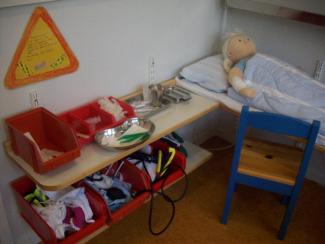
Giving Kids a Shot at Success
World Immunization Week
April 20, 2012
Beginning April 21, the World Health Organization (WHO) is launching World Immunization Week, a global awareness campaign about the importance of vaccines in preventing diseases like measles and polio. According to WHO’s website, “immunization is one of the most successful and cost-effective health interventions and prevents debilitating illness, disability and death from vaccine-preventable diseases.” An estimated 2 to 3 million deaths are prevented annually due to vaccinations but, as of 2010, 19.3 million infants were not up to date on their immunizations. And, according to the United Nations Foundation, of the nearly 8 million children worldwide under the age of 5 who die each year from preventable diseases, a quarter of those deaths could have been prevented with proper vaccination.

© Jen Fitzgerald
In the United States, the statistics are more uplifting – according to the Centers for Disease Control and Prevention in 2011, 95 percent of parents reported that their children got or would get all of their immunizations. However, approximately 5 percent of parents opted to decline some vaccines while 2 percent were not inclined to vaccinate their children at all, despite research from the American Academy of Pediatrics finding no long-term negative consequences to receiving all recommended immunizations.
As parents of preschoolers can attest, most centers require that children’s immunizations be up to date before enrolling. In addition, many programs require other health screenings before or during the preschool years. Pre-K is an important early opportunity to detect vision, hearing, and health problems that may impair a child’s learning and development. With this in mind, NIEER’s quality standards checklist includes a requirement that state-funded pre-K programs provide vision, hearing, and health screenings. Along with our benchmarks on nutrition and support services, screenings and referrals support children’s overall well-being, including their physical and mental health.
Assuring that children are immunized is one element of comprehensive health screening (the others are health/weight/BMI, blood pressure, psychosocial/behavioral, and full physical exam). For The State of Preschool 2011 report, we specifically asked states about their pre-K policies regarding immunizations. The good news is that 40 state pre-K programs (out of 51 across the nation) require preschool students have immunizations; in addition, the District of Columbia’s two pre-K programs also require immunizations. The remaining state programs typically leave decisions about screenings up to local district discretion. (For more information about screening and referral requirements, see page 178 of Appendix A.)
| Figure 1. State Pre-K Programs That Do Not Require Immunizations in State Policy* | |
| California | Pennsylvania Pre-K Counts |
| Florida | South Carolina 4K |
| Kansas Pre-K Pilot | Vermont Act 62 |
| Massachusetts | Vermont EEI |
| Nebraska | Wisconsin 4K |
| Nevada | |
*This figure does not include states that do not have a state-funded pre-K program. Those states are: Arizona, Hawaii, Idaho, Indiana, Montana, Mississippi, New Hampshire, North Dakota, South Dakota, Utah, and Wyoming.
| Figure 2. State Pre-K Programs Requiring Immunizations | |
| Alabama | New Jersey ECPA |
| Alaska | New Jersey ELLI |
| Arkansas | New Mexico |
| Colorado | New York |
| Connecticut | North Carolina |
| Delaware | Ohio |
| Georgia | Oklahoma |
| Illinois | Oregon |
| Iowa Shared Visions | Pennsylvania EABG |
| Iowa SVPP | Pennsylvania HSSAP |
| Kansas At-Risk | Pennsylvania K4 & SBPK |
| Kentucky | Rhode Island |
| Louisiana 8(g) | South Carolina CDEPP |
| Louisiana LA4 | Tennessee |
| Louisiana NSECD | Texas |
| Maine | Virginia |
| Maryland | Washington |
| Michigan | West Virginia |
| Minnesota | Wisconsin Head Start |
| Missouri | D.C. PEEP |
| New Jersey Abbott | D.C. Charter |
Still, there are 11 states without state-funded pre-K, and children in those states may be missing out on disease-preventing immunizations until they reach kindergarten or even first grade. The same is true for children who are shut out of state-funded pre-K due to the limited access to programs in many states. A rise in the spread of measles in 2011 indicates that there’s still more work to be done to protect all of our citizens, especially for those traveling internationally where vaccination rates are lower.
As immunizations increase across the globe, more and more children are being offered the chance to grow up healthy. This, in turn, improves their health, happiness, and ability to learn and succeed in school and later in life.
– Jen Fitzgerald, Public Information Officer, NIEER
About NIEER
The National Institute for Early Education Research (NIEER) at the Graduate School of Education, Rutgers University, New Brunswick, NJ, conducts and disseminates independent research and analysis to inform early childhood education policy.
